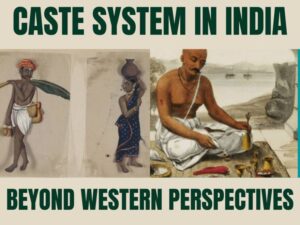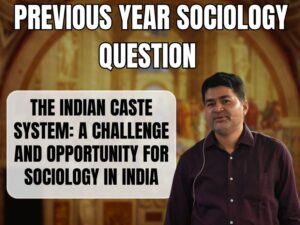Frequently Asked Questions:
1. Question: What is the primary consequence of casteism in Indian society?
Answer: Casteism in India divides people in the name of caste, encourages intolerance, jealousy, rivalry, and conflicts among caste members.
2. Question: How does casteism clash with the principles of democracy in India?
Answer: Casteism in India, rooted in inequality, clashes with democracy’s principles of equality and equal opportunities, leading to complexities in politics and governance.
Question: According to the blog, what can be done to reduce casteism in India through inter-caste marriages?
Answer: Encouraging inter-caste marriages can help reduce conflicts arising from casteism in India, as stated by Ghurye.
3. Question: What role do politicians play in perpetuating casteism in India, according to the blog?
Answer: Politicians often exploit caste sentiments for their own advantage, turning caste consciousness and prejudices into caste passions among the masses.
Question: What are some of the suggested solutions to combat casteism, as mentioned in the blog?
Answer: Solutions include creating economic and cultural equality between castes, minimizing the use of the term ‘caste,’ developing new attitudes among people, and promoting education and progress among backward classes.
5. Question: How has the nature of caste and caste conflict evolved in modern India, as discussed in the blog?
Answer: The presence of caste and caste conflict in modern India highlights the contrast between traditional cultural perceptions and modern values of equality and justice.
Reference: Static Portion
Related Blogs …
 |
 |

To master these intricacies and fare well in the Sociology Optional Syllabus, aspiring sociologists might benefit from guidance by the Best Sociology Optional Teacher and participation in the Best Sociology Optional Coaching. These avenues provide comprehensive assistance, ensuring a solid understanding of sociology’s diverse methodologies and techniques.
META TAGS:
Casteism in India, Indian caste system, endogamy, caste prestige, consequences of casteism, solutions to casteism, Indian democracy, inter-caste marriages, economic and cultural equality, social attitudes, UPSC questions on casteism, Casteism in India sociology, Casteism in India upsc, Casteism in Indian society, Casteism in Indian village, Casteism in Indian culture
Why Vikash Ranjan’s Classes for Sociology?
Proper guidance and assistance are required to learn the skill of interlinking current happenings with the conventional topics. VIKASH RANJAN SIR at TRIUMPH IAS guides students according to the Recent Trends of UPSC, making him the Best Sociology Teacher for Sociology Optional UPSC.
At Triumph IAS, the Best Sociology Optional Coaching platform, we not only provide the best study material and applied classes for Sociology for IAS but also conduct regular assignments and class tests to assess candidates’ writing skills and understanding of the subject.
Choose The Best Sociology Optional Teacher for IAS Preparation?
At the beginning of the journey for Civil Services Examination preparation, many students face a pivotal decision – selecting their optional subject. Questions such as “which optional subject is the best?” and “which optional subject is the most scoring?” frequently come to mind. Choosing the right optional subject, like choosing the best sociology optional teacher, is a subjective yet vital step that requires a thoughtful decision based on facts. A misstep in this crucial decision can indeed prove disastrous.
Ever since the exam pattern was revamped in 2013, the UPSC has eliminated the need for a second optional subject. Now, candidates have to choose only one optional subject for the UPSC Mains, which has two papers of 250 marks each. One of the compelling choices for many has been the sociology optional. However, it’s strongly advised to decide on your optional subject for mains well ahead of time to get sufficient time to complete the syllabus. After all, most students score similarly in General Studies Papers; it’s the score in the optional subject & essay that contributes significantly to the final selection.
“A sound strategy does not rely solely on the popular
Opinion of toppers or famous YouTubers cum teachers.”
It requires understanding one’s ability, interest, and the relevance of the subject, not just for the exam but also for life in general. Hence, when selecting the best sociology teacher, one must consider the usefulness of sociology optional coaching in General Studies, Essay, and Personality Test.
The choice of the optional subject should be based on objective criteria, such as the nature, scope, and size of the syllabus, uniformity and stability in the question pattern, relevance of the syllabic content in daily life in society, and the availability of study material and guidance. For example, choosing the best sociology optional coaching can ensure access to top-quality study materials and experienced teachers. Always remember, the approach of the UPSC optional subject differs from your academic studies of subjects. Therefore, before settling for sociology optional, you need to analyze the syllabus, previous years’ pattern, subject requirements (be it ideal, visionary, numerical, conceptual theoretical), and your comfort level with the subject.
This decision marks a critical point in your UPSC – CSE journey, potentially determining your success in a career in IAS/Civil Services. Therefore, it’s crucial to choose wisely, whether it’s the optional subject or the best sociology optional teacher. Always base your decision on accurate facts, and never let your emotional biases guide your choices. After all, the search for the best sociology optional coaching is about finding the perfect fit for your unique academic needs and aspirations.
Follow us :



Find More Blogs
| Compare and contrast Karl Marx’s and Max weber’s | Karl Marx- Historical Materialism |
| Position of Women In the Modern Indian Society | Sociology: Social system and pattern variables |

One comment